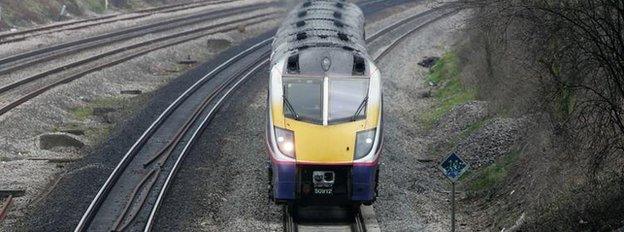Why not... nationalise the railways?
- Published
- comments

A look at eye-catching policy ideas that are often talked about but never seem to feature in UK general election campaigns.
The background
Britain's railways were nationalised by Labour in 1948 and returned to private hands by John Major's Conservative government in 1993.
Labour was initially committed to renationalisation but the policy was dropped when Tony Blair came to power in 1997. Track, signalling and stations were taken out of private hands, and put into a not-for-profit company, Network Rail, after the collapse of Railtrack in 2002.
Labour has yet to reveal its transport policies for the next general election, but they are not thought likely to feature rail nationalisation.
Green Party MP Caroline Lucas has launched a private members' bill to allow the train companies to "fall back" into public ownership, which is supported by a number of Labour backbenchers and Plaid Cymru MPs.
The train companies insist the debate about nationalisation is solely driven by the unions.
Ian Taylor: The case for nationalisation
In 1993, Britain's railway was broken into pieces and handed, mostly as local monopolies, to profit-taking companies.
The cost of the railway to the taxpayer has subsequently more than doubled in real terms, a rise out of all proportion to the 33% increase in train services over the same period.
The cost rises stem from wastage as shareholder dividend pay-outs, other inefficient private sector financing and inefficiencies created by fragmentation of the railway.
The wastage amounts to over £1bn per year, enough to cut fares by 20% if the railway were reunified as a public company.
Instead, fare increases on the privatised railway threaten to turn it into a "rich-man's toy", as this government's first Secretary of State for Transport put it.
Unbeknown to most passengers, one portion of our railway, the East Coast mainline, is still run by a publicly-owned company, Directly Operated Railways, which picked up the pieces after its two private sector predecessors walked off the job.
Recent calculations by the Office of Rail Regulation revealed how the public money that helps maintain the rail tracks or directly supports rail services splits between the train companies and showed that DOR receives less subsidy than any other rail franchise operator. DOR's success is a glaring embarrassment for the Government, who now intend to privatise it post-haste, even though that will increase costs to the taxpayer.
Most other rail franchises in the UK are, ironically, also run by companies that are wholly or partly publicly owned, but by other countries. Deutsche Bahn is foremost - they even run the Royal Train - and the German Government have said "We're skimming profit from the entire Deutsche Bahn...it is invested in the rail network here in Germany". So, if you are reading this on an overcrowded train with a ticket that made a painful hole in your wallet, take heart from your generous contribution to improvement of Germany's fine publicly-owned railway.
Ben Southwood: The case against nationalisation
The UK's railway network was built privately and competitively and by some way its most successful years were the private eras between 1830 and 1922 and 1994 to the present.
Returning it to centralised state control would be a step backwards and a mistake.
Instead we should end the practice of franchising, which creates private monopolies, and allow real competition and diversity.
Our system began with the first steam train in 1825, and despite costly government licenses, investors built the bulk of today's network (about 6,000 of approx 11,000 miles) in just three or so years, between 1844 and 1846.
Journeys rose to from about 500 million a year in the 1870s to 1.5 billion just before the First World War. After the war, David Lloyd George judged that rail firms profits were too low due to too much competition, and decided to merge nearly all the UK's railway firms into just four firms, practically monopolies.
Between 1923 and 1947 the so-called Big Four government-supported firms ran the roost and journeys fell to about 1.2 billion by the onset of the Second World War.
After the war, these and others were consolidated further into British Rail. Under British Rail, there were steadily fewer and fewer journeys per year—from around 1 billion in 1948 to only 750 million by 1995, just before the onset of the franchising system.
Now there are deep flaws with franchising, and undoubtedly it has been lucky, coinciding with higher congestion, fuel prices, and a renewed rise in London as the UK's economic centre. But the sharpness of the change since 1995 is undeniable.
Since then journeys have spiked dramatically, rising every year to close on the 1.5 billion not seen for almost a century.
The solution to our current problems is not more state bungling, it is a return to diversity, competition and open markets.
- Published3 July 2013